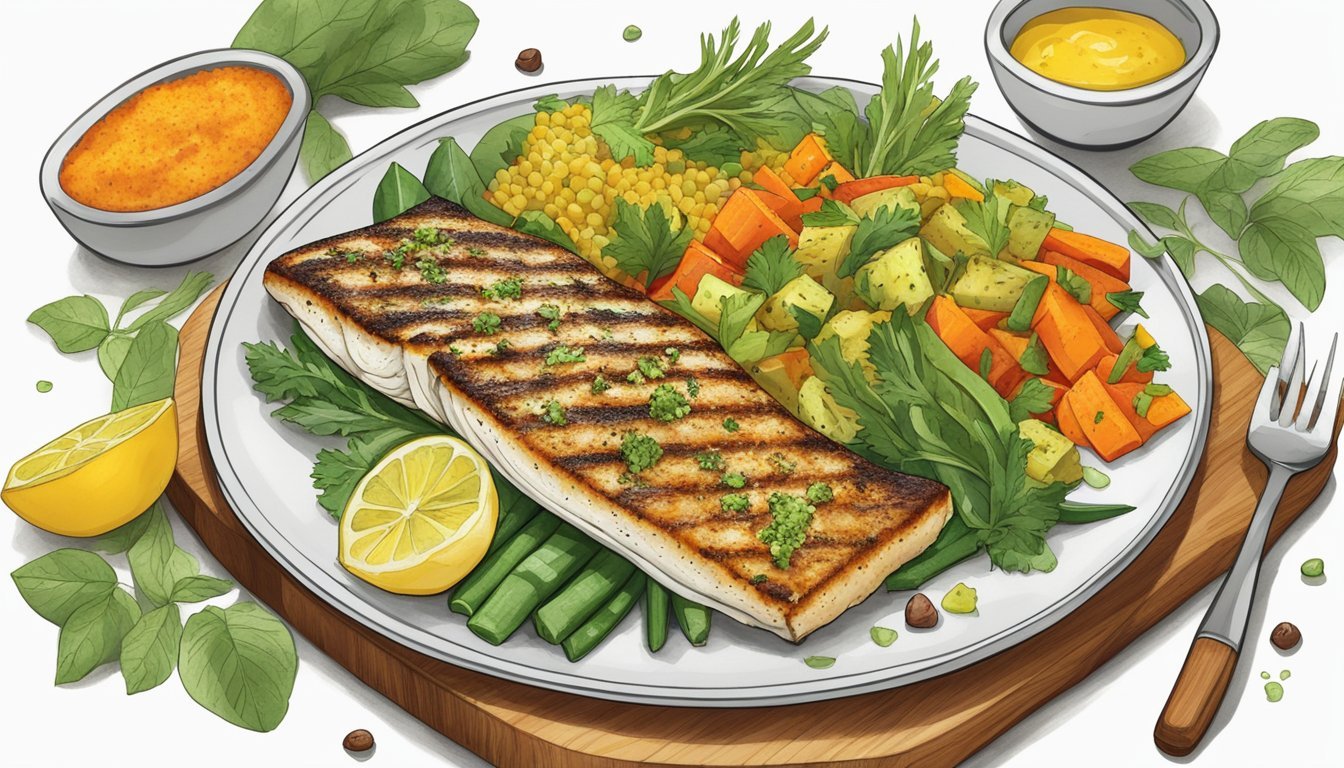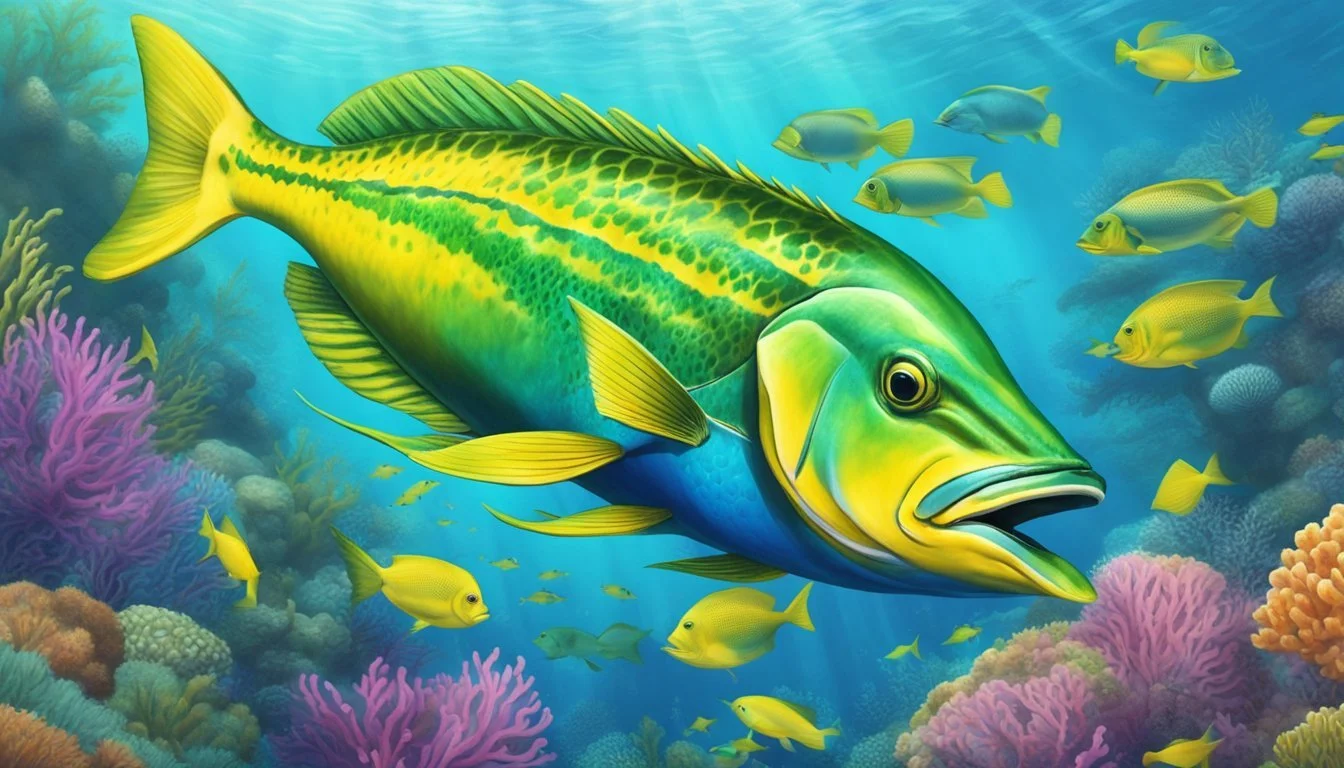Mahi-mahi Substitutes
Best Alternatives for Seafood Lovers
Finding the perfect substitute for mahi-mahi is essential when this popular fish is unavailable. Cod stands out as an almost perfect replacement, offering a mild taste and versatile cooking methods such as pan-frying, baking, and grilling. Another great option is halibut, known for its firm texture and ease of finding in markets, making it an excellent candidate for getting that mahi-mahi experience.
For those looking at alternatives with a unique twist, grouper offers adaptability in various dishes, whether grilled, baked, or deep-fried. Its similarity in texture ensures it can absorb flavors well. Additionally, both rainbow trout and marlin provide robust and flexible options for replacing mahi-mahi in meals, making them valuable additions to any seafood lover's repertoire.
Understanding Mahi-Mahi
Mahi-mahi, also known as dolphinfish, is cherished for its firm texture and mild flavor. It is a versatile fish, rich in various nutrients.
Characteristics of Mahi-Mahi
Mahi-mahi has a firm texture that holds up well in different cooking methods like grilling, baking, and frying. The flesh is typically lean and moist, with large flakes that make it easy to handle. Its mild, slightly sweet flavor is appealing to many palates, making it a popular choice among seafood lovers. Mahi-mahi can be identified by its vibrant, iridescent colors, which fade to a yellow-grey upon removal from water.
Nutritional Profile of Mahi-Mahi
Mahi-mahi is a nutritious choice, rich in protein and low in fat. A 3-ounce serving provides approximately 20 grams of protein. It is an excellent source of essential nutrients like vitamin B12, niacin, and phosphorus. Additionally, mahi-mahi contains omega-3 fatty acids, which are beneficial for cardiovascular health. These nutrients support various bodily functions, making mahi-mahi a wholesome addition to a balanced diet.
Substitutes for Mahi-Mahi
When choosing a substitute for mahi-mahi, consider the fish's flavor profile, texture, and cooking versatility. Some fish offer a similar mild taste and firm texture, while others might not hold up as well in certain preparations.
Factors to Consider when Choosing Substitutes
Flavor Profile: Mahi-mahi is known for its mild, slightly sweet flavor. When considering substitutes, look for fish with similar taste characteristics, as this will ensure the final dish remains balanced. Flavors can range from neutral to slightly sweet.
Texture: The firm texture of mahi-mahi helps it maintain shape across various cooking methods such as grilling, baking, and frying. Choose substitutes with a comparable firmness to avoid the fish falling apart during cooking.
Nutritional Value: Evaluate the nutritional content including fat content and key nutrients. While many white fish are low in fat, some may offer more omega-3 fatty acids, which is an added health benefit.
Best Overall Substitutes for Mahi-Mahi
Cod: Cod is a popular substitute for mahi-mahi. It has a mild flavor and firm yet flaky texture, making it versatile for grilling, baking, and frying. Cod's slight sweetness complements various seasonings.
Halibut: Halibut is another excellent alternative due to its firm texture and delicate flavor. It holds up well under different cooking methods and can be easily found in markets. Its nutritional value is also high, providing a good source of omega-3 fatty acids.
Grouper: Grouper provides a robust option, particularly for recipes requiring grilling or pan-frying. It has a firmer texture and a slightly stronger flavor but still fits well in dishes that call for mahi-mahi. Grouper is available as fillets, cubes, or steaks.
Fish to Avoid as Mahi-Mahi Substitutes
Tilapia: Tilapia, while widely available, has a softer texture and a more neutral flavor that can sometimes be bland. It does not hold up as well in grilling or frying and may fall apart easily.
Salmon: Salmon has a much stronger flavor and higher fat content, making it an unsuitable replacement for mahi-mahi in recipes that require a mild taste and firm texture.
Catfish: Catfish has a distinctive flavor that is more earthy and sometimes muddy. It lacks the firmness needed and can compromise the intended outcome of the dish.
White Fish Alternatives
When looking for alternatives to mahi-mahi, white fish with mild flavors and firm textures provide suitable replacements. These substitutes include cod, haddock, halibut, and sea bass, among others.
Cod and Haddock
Cod and haddock are common choices for replacing mahi-mahi. Cod is renowned for its mild taste and flaky texture, making it a versatile substitute. It is low in mercury, which is a crucial factor for many consumers. Rich in essential vitamins and minerals, cod supports a healthy diet.
Haddock, similar to cod, offers a slightly sweeter flavor. It’s well-suited for baking, frying, and broiling, and is often used in traditional fish and chips. Its white flesh and firm texture make haddock a reliable substitute in various recipes.
Halibut and Grouper
Halibut is another excellent replacement for mahi-mahi. It boasts a mild taste with a buttery texture, and holds up well to different cooking methods, such as grilling and roasting. Halibut is packed with nutrients, including omega-3 fatty acids, vitamin D, and selenium, supporting overall health.
Grouper offers a slightly stronger flavor compared to halibut but remains mild enough for most dishes. This fish has a firm, yet flaky texture that works particularly well in soups and stews. Grouper is rich in lean protein and essential nutrients, making it a nutritious option.
Sea Bass and Snapper
Sea bass is a prized choice for its delicate flavor and tender flesh. It is slightly sweet, with a buttery taste that complements various seasonings and marinades. Sea bass is low in mercury and rich in protein, making it a healthy alternative for mahi-mahi.
Snapper is known for its distinctive, yet mild flavor and pinkish flesh that becomes white when cooked. It’s versatile and works well in a variety of cooking techniques, including baking, grilling, and steaming. Snapper is beneficial due to its high vitamin and mineral content, supporting a balanced diet.
Other Fish Substitutes
Different fish can effectively replace mahi-mahi in various recipes by offering similar texture and flavor profiles. Below, we'll explore the characteristics of these substitutes, their best culinary uses, and nutritional benefits.
Substituting with Tuna and Swordfish
Tuna: Fresh tuna is a versatile substitute due to its firm texture and robust flavor. It holds up well in grilling, searing, or even sashimi. Tuna's deep red, pink flesh and rich taste make it suitable for replacing mahi-mahi in more flavorful dishes. Tuna is also rich in omega-3 fatty acids, making it a healthy option.
Swordfish: Known for its firm, meaty texture, swordfish's mild flavor can replace mahi-mahi in recipes like grilling, broiling, and baking. Its steak-like consistency allows it to absorb marinades and seasonings well. Swordfish also provides significant amounts of protein and essential fatty acids, enhancing both flavor and nutritional value in meals.
Substituting with Salmon and Trout
Salmon: Salmon is an excellent alternative, offering a rich, bold flavor and firm, flaky texture. Available as fresh, frozen, or smoked, salmon's versatility extends to grilling, baking, or poaching. Its high omega-3 content supports heart health, and its pink flesh adds color and appeal to dishes.
Trout: Specifically, rainbow trout can serve as a substitute, providing a delicate, slightly sweet flavor and tender flesh. Perfect for grilling or pan-frying, trout's versatility covers a range of cooking methods. Rich in omega-3 fatty acids and protein, trout is a nutritious and tasty replacement for mahi-mahi.
Preparing Mahi-Mahi Substitutes
When substituting mahi-mahi, selecting the right fish and preparing it properly ensures that the flavor and texture remain satisfying. Cooking methods and recipe adaptations are crucial for achieving excellent culinary results.
Cooking Methods for Fish Substitutes
Different cooking methods can highlight the qualities of various fish substitutes. Grilling is an optimal choice for grouper, as it maintains the fish's firmness and enhances its smoky flavors. Baking works well for cod, locking in moisture and achieving a flaky texture.
Pan-searing is ideal for halibut, creating a crisp exterior while keeping the inside tender. Broiling marlin offers a robust flavor and cooks the fish quickly, preserving its moistness. For those who enjoy fish tacos, poaching rainbow trout keeps the fish tender and perfect for combining with vibrant salsas and slaws.
Recipe Adaptation for Substitutes
Adapting recipes to accommodate mahi-mahi substitutes involves slight modifications to cooking times and seasoning. When grilling grouper, preheat the grill to medium-high and coat lightly with oil to prevent sticking. Cooking for 4-5 minutes per side achieves the best results.
For baked cod, season with herbs and spices, and bake at 375°F for 15-20 minutes until flaky. When pan-searing halibut, heat a skillet over medium-high and sear for 3-4 minutes per side for a golden-brown crust.
If the recipe calls for broiled marlin, set the broiler to high and cook for 4-6 minutes to retain juiciness. For poached rainbow trout, simmer the fish in a flavorful broth for around 5 minutes, perfect for assembling into fish tacos with preferred toppings.
Additional Considerations
When choosing a substitute for mahi-mahi, it is essential to pay attention to economic and ecological factors along with health considerations. Each of these aspects directly impacts the choice and quality of fish available to consumers.
Economic and Ecological Factors
The availability and sustainability of fish species vary by region. Substitutes like cod, grouper, and halibut are generally found in both the Pacific and Atlantic Oceans. However, the ecological impact of fishing practices can vary significantly.
Sustainable choices often come from well-managed fisheries. Fish such as halibut and certain cod species are managed to avoid overfishing.
Cost is another factor. Some substitutes may be more economical due to regional abundance or lower demand. Grouper and cod are sometimes more affordable than mahi-mahi, also known as dolphin fish or dorado.
Health Considerations when Selecting Fish
Nutritional value is crucial when choosing a fish substitute. Mahi-mahi is high in lean protein, omega-3, and essential vitamins such as B vitamins and vitamin B6. Substitutes should ideally match these benefits.
Mercury levels are a critical factor. Fish like grouper tend to have higher mercury content, which can be a concern for vulnerable populations like pregnant women and young children.
Calories and other nutritional aspects such as levels of potassium and selenium should also be considered. Cod and haddock, for example, are lower in mercury and calories but still provide substantial nutrients.
By considering such specific factors, consumers can make informed choices aligning with both health and sustainability goals.








